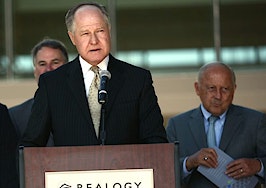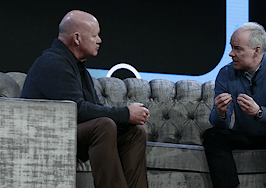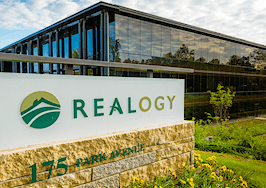A new mission statement from a powerful group of American CEOs argues that diversity and social responsibility should be corporations’ top priorities, though a former Realogy executive slammed the statement as a potential “death spiral” for the economy.
The Business Roundtable published its new “Statement on the Purpose of a Corporation” Monday. The statement argues that “Americans deserve an economy that allows each person to succeed through hard work.” It also emphasizes “dignity” and calls on companies to compensate employees fairly, foster diversity, and “protect the environment by embracing sustainable practices across our businesses.”
By contrast, the statement only mentions shareholder value at the very end, suggesting that perhaps profit ought to be less of a priority than various social responsibilities. That’s a radical shift for the Business Roundtable, which in 1997 said executives’ single most important responsibility is to create value for shareholders.

Jamie Dimon
“The paramount duty of management and of boards of directors is to the corporation’s stockholders,” the past statement declared.
All of this matters because the Business Roundtable’s membership includes top executives from a host of powerful companies such as General Motors, IBM, JPMorgan Chase & Co., Chevron, Lennar, Walmart and many others. Both Apple’s Tim Cook and Amazon’s Jeff Bezos are members and the prestigious roster means the Business Roundtable has significant influence over the tone and objectives of U.S. corporations.
Members of the group praised the new mission statement this week. For example, JPMorgan Chase & Co. CEO Jamie Dimon said in a statement that the “American dream is alive, but fraying.”
“These modernized principles reflect the business community’s unwavering commitment to continue to push for an economy that serves all Americans,” he added.
Not everyone, however, was pleased.
In a conversation with Inman Friday, Richard Smith — who served as Realogy’s CEO and president before retiring in 2017 — slammed the new mission statement as “a very poorly drafted document.” He also argued that the Business Roundtable’s statement ultimately obscures what should be any corporation’s main focus: Making money.

Richard Smith
“Their purpose in life is to create shareholder value,” Smith said. “For them to put shareholder value last on the list is just unbelievable to me.”
Smith is not opposed to corporations engaging in socially conscious activities. Quite the contrary, in fact, and he said that numerous companies do “an enormous amount of good for their communities.” But he said that those activities are only possible when a company is making a profit. Cut off the money, in other words, and there are no more diversity initiatives or charity programs.
“If you’re sitting around the table and only talking about how to be good for the community,” Smith said, “you’re going to fail in short order and all those employees who are asking for more will get less because they’re going to be unemployed.”
Asked if attitudes about the importance of profit in the U.S. are simply changing, Smith replied that “that’s not how it works” and that “capital goes where its welcome.”
“You take that fundamental away from our economy and the economy will collapse,” he continued, adding a moment later that the Business Roundtable’s new approach represents a potential economic “death spiral.”
As a result, Smith concluded that despite the Business Roundtable’s new statement and its roster of power players, corporations’ objectives aren’t going to change.
“This is the media push for companies to do more than they do today,” he said. “But that is simply not their job. Their job is to create shareholder value. Period.”
Still, many firms in the real estate space already seem to have embraced parts of the new mission statement. Just this week, for example, Zillow released what it called a “sustainability report” that goes into detail about the company’s efforts to boost diversity and participate in charitable causes.
Most other big real estate brands have programs aimed at improving their communities. Compass has Compass Cares, which lets employees and agents donate to local causes. Keller Williams operates Keller Williams Cares, which it describes as a public charity for members of the company who are impacted by emergencies. And Realogy runs its own charitable foundation.
The existence of these programs — and others in the industry that focus on things like diversity or the environment — suggests that at very least social responsibility has grown in importance. How such programs relate to profit is another question, and one that’s difficult to answer.

Nick Shivers
However, Nick Shivers, who leads an eponymous Keller Williams team in Oregon argued that social responsibility and profit are inherently intertwined.
“I think in order to make it in this new world of real estate you have to build a tribe,” he told Inman Friday.
Shivers first started merging his real estate business and charity work a decade ago after visiting a garbage dump in Nicaragua. He described the visit as similar to “entering the gates of hell” and said he saw families prostitute out their young girls in order to get first dibs to dig through the trash.
“The sound of the garbage trucks, the buzzards blocking out the sun because there’s so many, and the stench and the trash,” he recalled. “It’s so surreal it’s not real.”
The experience prompted Shivers to start a program that provides education and opportunities.
“We’ve taking 56 girls out of a Managua garbage dump,” he said.
Those efforts have since evolved into a real estate oriented charitable organization dubbed “Sell a Home, Save a Child,” which operates in multiple countries. Shivers said the organization has raised about $1.7 million over the years.
Shivers team is obviously not a Fortune 500 company, but in many ways his efforts capture the spirit of the Business Roundtable’s new mission statement. How that statement ultimately shapes corporate profits remains to be seen, but in Shivers case he takes a fundamentally different approach than Smith.
“I have a tribe of people who know what I do and I build my tribe on something that is really impactful,” he said. “When you’re focus is on others, I believe the money always comes.”













